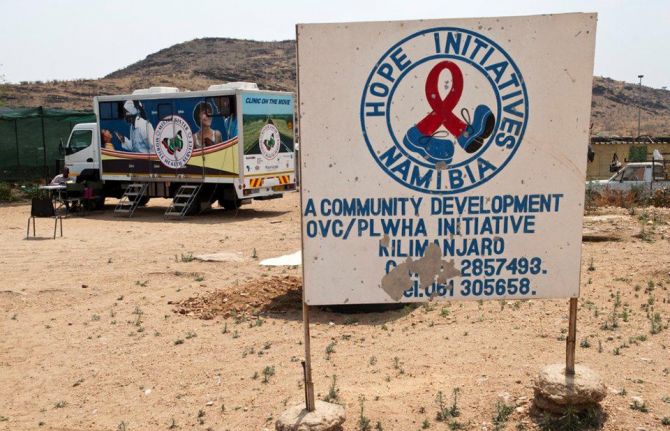
Feature Story
Gains in Ethiopia’s national AIDS response highlighted at World AIDS Day event
01 December 2011
01 December 2011 01 December 2011
Ms. Jan Beagle, UNAIDS Deputy Executive Director, Management and External Relations speaks at the World AIDS Day commemoration in Addis Ababa.
Credit: UNAIDS.
Ethiopia’s progress in its national AIDS response has been celebrated at a World AIDS Day commemoration event in Addis Ababa, which was attended by the UNAIDS Deputy Executive Director, Management and External Relations, Ms. Jan Beagle.
Ms. Beagle was joined by the President of the Federal Republic of Ethiopia, Mr. Girma Wolde-Giorgis, Minister of Health, Dr. Tedros Adhanom, the Mayor of Addis Ababa and the Executive Director of the Network of Networks of HIV Positives in Ethiopia, Dereje Alemayehu. Key supporters of the Ethiopian national AIDS response also participated in the commemoration, including the U.S. President’s Emergency Plan for AIDS Relief (PEPFAR), which has invested more than US$ 1.4 billion in country’s AIDS response.
Remarkable scale-up
Speaking at the commemoration, Ms. Beagle commended Ethiopia’s achievements said, “Ethiopia's remarkable leadership in investing in voluntary counselling and testing has resulted in more than 9.4 million people receiving HIV counselling and testing in 2011 alone, and subsequent increased access to HIV services, in particular antiretroviral treatment.”
Ethiopia's remarkable leadership in investing in voluntary counselling and testing has resulted in more than 9.4 million people receiving HIV counselling and testing in 2011 alone, and subsequent increased access to HIV services, in particular antiretroviral treatment
Ms. Jan Beagle, UNAIDS Deputy Executive Director, Management and External Relations
The HIV epidemic in Ethiopia is largely concentrated in urban areas and represents one of the biggest epidemics in Africa. It is estimated that in the capital city of Addis Ababa alone, some 300 000 people are living with HIV, equivalent to approximately 25% of all Ethiopians living with HIV.
Speakers at the World AIDS Day commemoration highlighted recent progress in the national response, including dramatic declines in HIV incidence in urban areas. The high-level participants also congratulated the Government on its hosting of the International Conference on AIDS and STIs in Africa (ICASA), which starts on 4 December and is considered a key advocacy platform for the continent’s response.
AIDS free generation in Ethiopia
Alongside the aspiration of an AIDS free generation in Ethiopia, speakers identified the UNAIDS goal of zero new HIV infections, zero discrimination, and zero AIDS-related deaths as a common vision for stakeholders.
A group of mothers living with HIV addressed the audience and highlighted how the provision of services to eliminate new HIV infections among children meant that their babies were born free of HIV.
Funding the AIDS response is a good investment and a shared responsibility of all countries. Member States of the African Union will have to invest more domestic resources in the response
Ms. Bience Gawanas, AU Commissioner for Social Affairs.
At a commemoration at the African Union (AU) headquarters in Addis Ababa earlier the same day, representatives of the AU, Member States, civil society, youth groups, and international organizations celebrated impressive results in the AIDS response throughout the African continent.
Concerns were raised about dwindling international resources available for AIDS programmes, and there were calls for AU Member States to increase domestic investments in order to ensure the sustainability of the response. There was also a commitment to the principle of shared responsibility, which was described as timely and required. The AU Commissioner for Social Affairs, Ms. Bience Gawanas, said, “Funding the AIDS response is a good investment and a shared responsibility of all countries. Member States of the African Union will have to invest more domestic resources in the response”.


